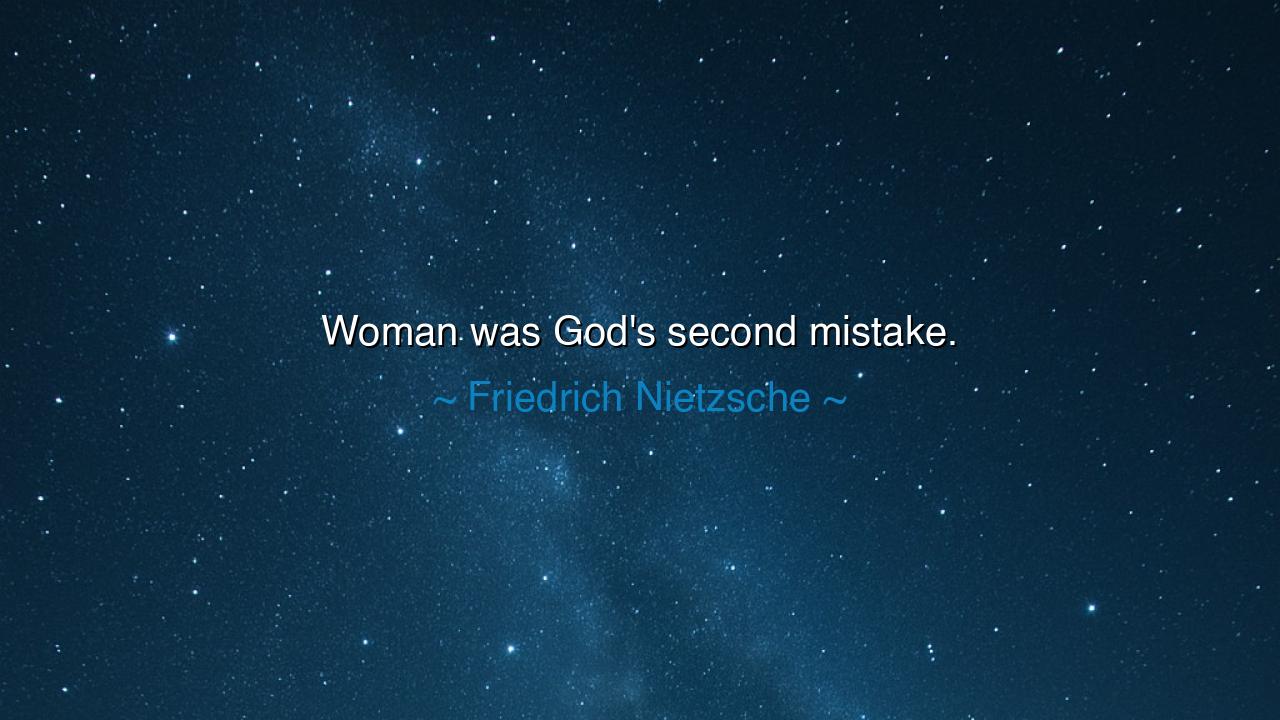
Woman was God's second mistake.






“Woman was God’s second mistake.”
So wrote Friedrich Nietzsche, the philosopher who walked through the fire of doubt and dared to speak against the heavens themselves. His words are sharp as a blade, forged in irony and rebellion, yet beneath their seeming blasphemy lies the restless cry of a soul searching for meaning in the ruins of faith. To understand this saying, one must not take it as insult, but as revelation — the expression of a man who looked upon human creation and saw both its glory and its flaw, its divine beauty and its endless contradiction. Nietzsche’s tone was that of a prophet scorned by his own age, who saw that what men call “mistake” may, in truth, be the very key to their becoming.
In the ancient manner, let us read not with outrage but with understanding. When Nietzsche spoke of God’s second mistake, he was echoing an old myth — that of the Fall, when the first humans reached for forbidden knowledge. If Adam was the first error — the creation of a being proud enough to defy — then Woman, in Nietzsche’s reflection, was the second, for through her came both the temptation and the awakening of man. Yet, within this “mistake,” lies the seed of greatness. For without the bite of the fruit, there would be no consciousness; without Woman, there would be no birth of longing, no stirring of wisdom through love and suffering. Thus, what he calls “mistake” is not condemnation, but the recognition that creation itself is bound to imperfection — and that within imperfection lies the path to transcendence.
Nietzsche’s words were written in an age when he warred against the old gods, seeking truth beyond the walls of dogma. He saw that humanity, torn between instinct and reason, light and shadow, is itself the divine experiment — beautiful, dangerous, incomplete. The “mistake” is not in woman’s nature, but in the tension between our mortal desires and divine ideals. Woman, to Nietzsche, embodied life’s power — sensual, creative, chaotic, ungovernable. She was not the fall of man, but the mirror of nature herself: wild, fertile, untamed. His words sting because they unveil the truth that what we call “mistake” in the divine order is often what gives life its fire and motion.
Consider Eve, the ancient mother of all. She took what was forbidden — not out of malice, but out of hunger for truth. And for this, she was cursed, yet she also awakened humanity to knowledge. Her act, branded as sin, was also the spark of awareness. Nietzsche saw in her the eternal paradox: that wisdom is born from defiance, and that love and pain are bound together. In calling woman God’s “second mistake,” he was not scorning her, but exposing the divine irony — that the very source of man’s suffering is also the source of his creation, his evolution, his longing for eternity.
So too in history, we see that what the world condemns as “mistake” often becomes the seed of greatness. Joan of Arc, a young peasant girl, was mocked, feared, and condemned as a heretic — a “mistake” in the eyes of the powerful. Yet, through her courage, she changed the course of nations. Her flame consumed her body, but not her spirit. In her, the so-called “error” of divine inspiration through a woman became proof of transcendence. Nietzsche’s paradox echoes here: what seems flaw or folly to men may be the hand of the divine shaping destiny through chaos.
To those who hear these words, take care not to see bitterness where there is reflection. Nietzsche was a philosopher of struggle, not serenity. He believed that the divine — if it exists — works through error, that creation itself is tragic, and that only through embracing that tragedy can we rise above it. The “mistake” of woman, of man, of life itself, is the crucible through which strength, compassion, and understanding are born. Every fault is a teacher, every loss a revelation.
The lesson, then, is this: Do not fear imperfection, and do not despise what seems flawed in yourself or in others. What the world calls “mistake” may be your calling. What breaks you may also build you. Woman, in Nietzsche’s vision, is not a flaw, but the embodiment of life’s untamable truth — that love, beauty, and pain are bound in one eternal dance. Embrace the chaos within creation, for through it shines the divine spark of becoming. As the ancients taught, perfection is not the absence of error, but the transformation of error into wisdom.
Therefore, walk through your own contradictions without shame. Let your failures teach you, your wounds deepen you, and your humanity refine you. For perhaps the greatest mistake of all would be to believe that the divine does not dwell within our imperfections.






AAdministratorAdministrator
Welcome, honored guests. Please leave a comment, we will respond soon